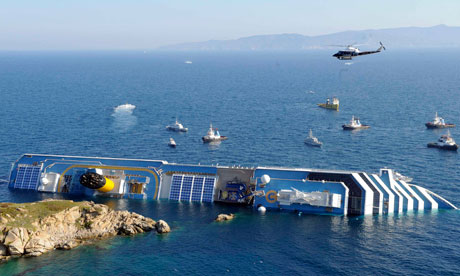A luxury cruise ship Costa Concordia leans on its side after running aground the tiny Tuscan island of Giglio, Italy,
They're often billed as the ultimate in worry-free vacations. But cruise critics say these floating hotels -- some as high as 12 storeys tall -- aren't nearly as safe as claimed.
Fire, power failures, crime and tragic overboard deaths are common on cruise vacations, said Ross Klein, a Memorial University sociologist and author of two books on the cruise industry.
The ships, which can carry more than 4,000 passengers, are as big as towns, Klein said, packed with strangers often bent on having a good time. Many passengers wrongly let their guard down.
"People should go on cruise ships with their eyes wide open, to be aware that there can be accidents." Klein told CTVNews.ca.
Last year, 22 people fell overboard on cruise ships, Klein said. Some were accidents. Others were suicides. The vast majority were fatal, said Klein, who compiles cruise accident data for his website www.cruisejunkie.com.
Fires and power failures are also common, though rarely reported in the mainstream media.
Incidents include:
- In September 2010, an explosion aboard the Cunard's Queen Mary 2 caused a power failure as it approached Barcelona, causing it to drift off the Spanish coast.
- In November 2010, a drunken passenger dropped an anchor on a cruise enroute to Tampa from Mexico.
According to data Klein collected, the risk of sexual assault is nearly 50 per cent greater on a cruise ship than on land in Canada. He used data collected by the Federal Bureau of Investigation and internal industry documents used in lawsuits between 2003 and 2005.
"I believe passengers should go on to a ship well informed," Klein said.
"The industry markets itself as . . . . one of the safest modes of commercial transport in the world. And they want passengers to believe that if they come on a cruise ship they are virtually safe."
An umbrella group for the cruise industry says it's monitoring the latest accident off the Italian coast, where three people have died and dozens are missing.
The website for the Cruise Lines International Association said the group "would like to reassure other cruise passengers that all CLIA member lines are subject to the highest safety standards around the world and according to international maritime requirements."
CTVNews.ca called the association on Saturday, but there was no answer at its Florida office.
U.S. maritime lawyer Jim Walker once represented the cruise industry but switched sides about 15 years ago. Since then, he's represented dozens of passengers and crew members in lawsuits against cruise lines.
Mr. Walker represented the family of George Smith, who vanished from a Royal Caribbean ship while on his honeymoon in 2005. His family suspected foul play and claimed the cruise ship failed to properly investigate the disappearance. His family won a US$1.3 million suit against the cruise line.
Walker also represented a 35-year-old woman who said she was sexually assaulted by a crew member on a Royal Caribbean vessel. Walker said the woman's case resulted in tough reporting rules aboard cruise ships.
Walker urged passengers to be vigilant about crime and safety.
Despite potential dangers, Klein said he loves ocean travel and has taken 30 cruises.
"I love being at sea," he said. "I like to look at the horizon." At sea, he said, "time stands still. It's a wonderful feeling."













